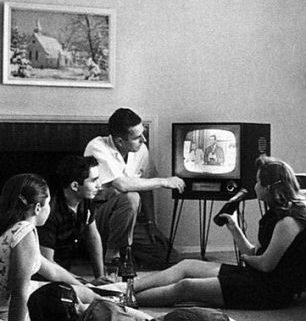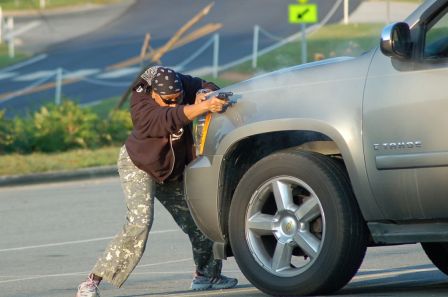TV: Fun And Fictional, Not Actual and Factual
Each night people from all over the world settle in to watch their favorite television sleuths solve the latest murder. You can’t turn the channel without seeing some sort of well-dressed investigator using fancy tools and equipment that would make the creators of Star Wars and and Star Trek drool with envy.
Shows such as CSI, Law and Order, and Castle are works of fiction. They’re written for our entertainment, not as research guides. Sure, some of the tools and procedures used on the shows are correct, but they’re often utilized in less-than-real situations.
Many real-life cops, prosecutors, medical examiners, and doctors cringe when they see how their profession is portrayed on the small screen. I know I have a hard time watching most of them. If I want to see real police work in action I watch reruns of the The Andy Griffith Show. For realism and an inside look at the daily lives of police officers, TNT’s Southland is top of the line. It’s probably the most realistic cop show that’s ever been on TV. Still, even Cooper and Sammy sometimes stretch the boundaries of realism.

The Andy Griffith Show did a great job of showing the compassionate side of law enforcement officers. They let their audience know that cops are real people, with real emotions, and real everyday problems.
Southland depicts police work in true form. This is how it’s really done, folks. No fancy tools or equipment, just cops doing what they do best – hitting the streets, searching for evidence, knocking on doors, and talking to people.
Fact v. Fiction
Here are a few examples of what not to believe on television shows about cops and crime scene investigation:
TV – Cops advise suspects of their rights the second they slip a pair of handcuffs on the crook’s wrists.
Fact – Miranda warnings are only read to suspects who are in custody, prior to questioning. Not the moment they click the cuffs in place. Sometimes it’s not necessary to advise the suspect of his rights. No questions = No Miranda.

Oops! Wrong Miranda.
TV – Cops fire warning shots. Or, they shoot bad guys in the leg or arm to stop them
Fact – False. Officers do not fire warning shots. What goes up must come down. And, officers never aim for legs and/or arms. Instead, they aim for center mass, shooting to stop the immediate threat.
No warning shots!
TV – Doctors leave the hospital to search a patient’s house looking for clues.
Fact – You can barely get a doctor to check on patients in their hospital rooms. They’re certainly not going to someone’s house. (My apologies to Doug Lyle). Searching homes and other property is a duty of police officers, not doctors.
TV – DNA test results come back in three hours.
Fact – DNA testing normally takes a minimum of two or three days. More than likely it will be several weeks before detectives receive the test results.
TV – Detectives draw chalk outlines around dead bodies.
Fact – No. Drawing a chalk outline could destroy or alter crucial evidence.

No chalk outlines
TV – Cops leave the scene of a crime with lights and sirens going at full blast.
Fact – No. Officers only use lights and siren on the way to emergencies. Leaving a crime scene with the suspect safely cuffed and stuffed in the back seat is not an emergency.
TV – CSI technicians chase criminals and investigate crimes.
Fact – Although they’re they’re highly-trained experts in their field, many CSI technicians are not sworn police officers. They have no authority to investigate crimes and arrest criminal suspects. So, no, they do not run after crooks while wearing high heels or two-thousand-dollar suits

Many CSI technicians are not certified, sworn police officers.
*Please don’t use television as a source for research about police officers. Always contact your local law enforcement officer or other trusted expert in the field for correct information that best suits the needs of your story.
Talk to an actual police officer, not someone whose third cousin was once married to a police officer’s sister’s husband who knows a guy’s barber who once lived two blocks over from a guy who went to school with a girl who works as a cleaning lady at the police department. That sort of information is not what I’d consider credible.
Unless someone has actually worn the uniform, carried a gun, worked a crime scene, and actually arrested a criminal, they’re just telling you something they’ve heard, read, or something they think they may know. After all, when you need information about plumbing, you don’t call an airplane pilot, right?
* * *
Attention!
Registration for the 2013 WPA opens this Friday, 3-15-13. The event sold out last year and we expect it to do so even faster this year. So please register early. This is not one you’ll want to miss.
We have a new registration system in place this year, so please read each section carefully before making your selections.
Additions, changes, and schedule updates are added to the website each day, so please check in often.
This the largest, best, and most exciting WPA we’ve ever produced!
See you in September!










And, of course, the Writers’ Police Academy. By the way, registration opens for the 2013 WPA on Friday at 8pm 3-15-13.
What more can I say besides..AMEN!!!!!!
Another place to get good information on police procedure is your local police academy. I attended two years ago. Most people were there to volunteer. I was the only one scribbling furiously when the patrol officers came in to talk to us.
Jodie
Great post Lee and thanks for keeping us up to date and informed. Thanks also for sharing information on your loop. Can’t make the WPA this year but maybe sometime in the next year or two.
You missed a prime opportunity to plug your book, Lee. Of course, if you can’t talk to a real-life cop, buy Lee’s book and get the correct information 🙂
Loved this post; I needed a giggle today, thanks.
Apparently you can not just ask a girl to prom anymore. It is big production. For my niece it was a big CSI crime scene ! Very cute.
Excellent and agreed with Pat’s comment! Makes all the difference 🙂
I’m with Melanie here. That second to the last paragraph is priceless. Keep up the good work keeping us informed.
Great post as usual, Lee. I learn a ton from you on here and when you do your CASTLE reviews, appreciate the blog. You’ve praised SOUTHLAND in the past for its (as close as TV gets) realism, but I was curious as to your thoughts about a couple of older shows (if you’ve watched) HILL STREET BLUES and HOMICIDE: LIFE ON THE STREETS. They seemed to be a good portrait of police work I always thought, again within the confines of dramatized fiction, and wondered if you agreed.
I also thought the original LAW & ORDER and the spin-off SVU did a fairly good job early on. But they, like others, caught the CSI bug and figured viewers wouldn’t watch without all the big screen computerized monitors and space age video enhancing baloney and iphone tracking nonsense they show now.
Anyway, great post, and thanks again for what you do.
My favorite detective show is “Columbo” which I’m sure makes Lee cringe because the sleuth breaks every rule in the book. No gloves while inspecting a crime scene. Everyone (including the murderer) tramples through the crime scene. Columbo sticks important clues in his pocket and carrys them around. Once he even took home some cheese from a crime scene to eat later! Real cops don’t keep the prime suspect informed about the investigation. Columbo never carries a gun and he bribes another officer to take his shooting tests for him! One of the show’s creators admitted that “Columbo” was fantasy, not a realistic look at the LAPD. But still a fun show to watch.
Too funny, Lee. You cracked me up.
Great information, Lee. And maybe this year I can swing the Writer’s Academy!
Yes, it was done in years past. With today’s technology, though, drawing the outline is no longer necessary.
Hey Lee, just curious: If cops don’t draw chalk outlines, where did that come from? Did they do it in the past?